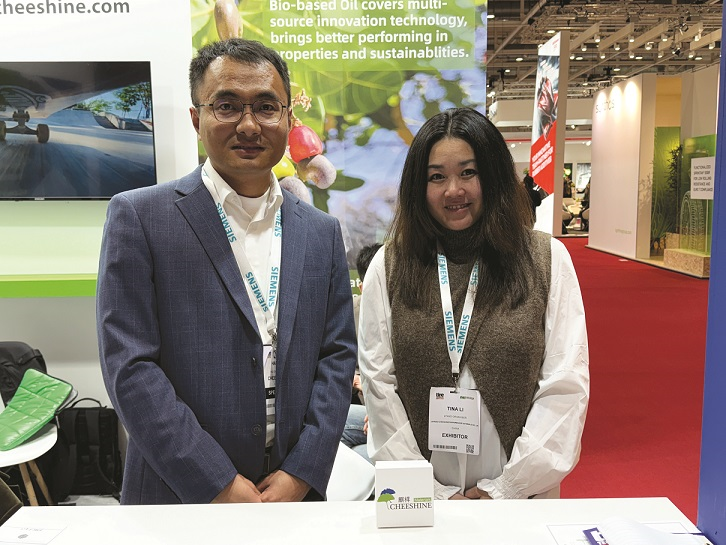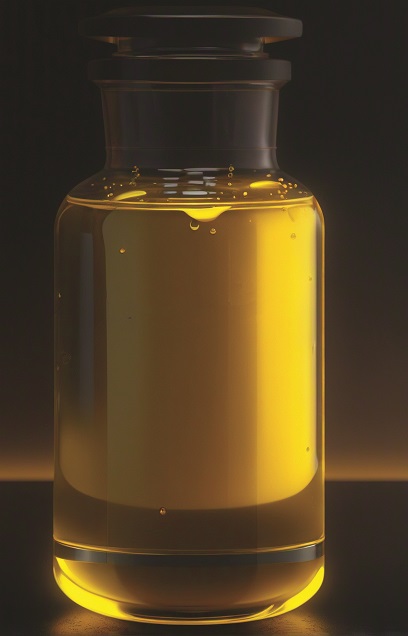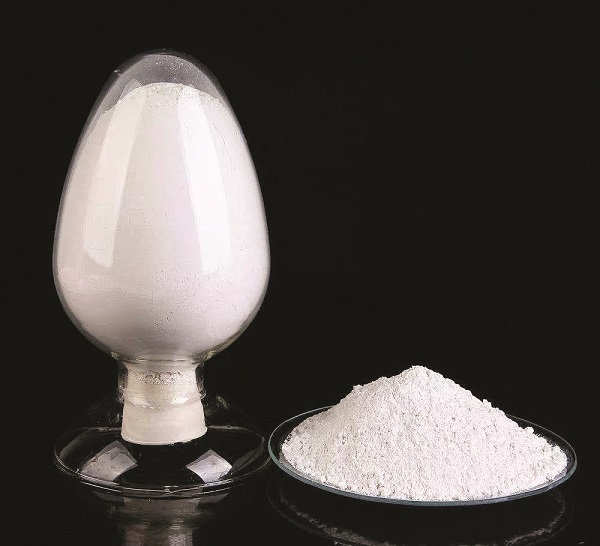- Shanghai Cheeshine Novel Materials Technology
- Hai Li
- School of Polymer Materials
- Qingdao University of Science and Technology
Are Bio-Based Materials A Growing Trend Within The Tyre Industry?
- By Sharad Matade & Gaurav Nandi
- July 02, 2025

As sustainability becomes central to the tyre industry’s evolution, the spotlight is now shifting from just recyclability and circularity to a newer, promising domain – bio-based materials. While global tyre manufacturers invest heavily in de-carbonisation strategies, companies like Shanghai Cheeshine Novel Materials Technology Co., Ltd. are at the forefront of pushing this transition further. With a growing portfolio of innovative, high-performance bio-based solutions, Cheeshine is betting on the increasing demand for greener alternatives. However, as industry adoption remains cautious, especially in replacing petroleum-derived materials, the road to mainstream acceptance of bio-based materials may still require both technological refinement and a stronger market-driven pull.
Sustainability, recyclability, circularity and renewable materials are the main keywords of the current tyre industry. Companies have invested millions in its efforts towards reaching sustainability goals and attaining a circular economy.
But there is also a new buzz word in town – bio-based raw materials. Cheeshine is confident that the tyre industry has developed an interest towards such materials in its quest towards a sustainable future.
Speaking exclusively to Tyre Trends, the company’s Director of Research and Development Centre, Hai Li, said, “Our goal is to support the rubber industry’s sustainable development. That’s why we’ve selected certain bio-based materials, and through modification, enhanced their properties to make them suitable for rubber applications. There’s growing demand for bio-based materials in tyres due to increased environmental awareness and the need for greener alternatives.”
Founded in 2005 in Shanghai, the company delivers different products and services to the rubber industry. Over more than a decade of growth, the company has expanded its footprint with factories and offices in Jiangsu Huai’an, Jiangsu Suzhou, Shandong Linyi, Hong Kong, Chongqing, Tianjin, India and France, serving a global customer base.
It maintains long-term collaboration with leading Chinese universities and in 2016 established the ‘Cheeshine Scholarship’ at the School of Polymer Materials, Qingdao University of Science and Technology to support innovation in research and development.
With strong research and development capabilities and large-scale production capacity, Cheeshine offers six core product categories including low rolling resistance silane, high-temperature resistant cross-linking agents, wet-skid resistant resins, adhesion promoters, special reinforcing fillers and environmentally friendly processing oils.
It currently holds 108 patents and several technologies for which it has filed PCTs. A standout example is its high dispersion precipitated silica by carbonisation, the precipitated silica via CO₂ substitution for sulfuric acid, a process that currently sets it apart as the only manufacturer with this capability.
MANUFACTURING PROWESS
The company focuses on the ‘magic triangle’, which, in the tyre industry, is referred to the balance between three critical performance factors viz-a-viz rolling resistance, wet grip and wear resistance.

Cheeshine Materials manufactures through its three factories in China and ships worldwide. Its research and development hubs are also located within the country. “We’re a research and development-driven company. Our largest development centre is in Suzhou with over 80 team members, most of whom hold master’s or doctoral degrees. We have a total of three R&D centres. Our teams work closely with clients to co-develop customised and high-performance solutions. We have two main production bases – one in Hua’an, Jiangsu Province, and another in Shandong Province,” said Li.
The company registered a turnover of USD 120 million in 2024 and serves a global base of over 500 customers. Within the tyre industry, it majorly works with the global top 10.
Li expressed pride in the company’s innovations and emphasised on the broad portfolio of rubber additives and sustainable materials. Claiming that the company has a strong market presence both in China and internationally, he provided an overview of the core offerings.
 Under the category of bio-based products, Li highlighted a rubber processing oil derived from modified cashew nut shell oil, a product he claimed is manufactured in China only by his company. This oil not only improves compatibility with rubber compounds but also contributes to sustainability. Another innovation was the modified natural rubber (epoxidised NR), developed to serve as a bio-based alternative to synthetic SSBR, offering enhanced performance.
Under the category of bio-based products, Li highlighted a rubber processing oil derived from modified cashew nut shell oil, a product he claimed is manufactured in China only by his company. This oil not only improves compatibility with rubber compounds but also contributes to sustainability. Another innovation was the modified natural rubber (epoxidised NR), developed to serve as a bio-based alternative to synthetic SSBR, offering enhanced performance.
In terms of eco-friendly fillers, he pointed to the high-dispersion precipitated silica by carbonisation, which is more environmentally friendly than traditional sulfuric acid-derived silica and also improves dispersion in rubber compounds. He also mentioned a high-performance liquid rubber additive known for its excellent compatibility and market success.
For advanced functional additives, he cited the modified silane coupling agent, designed to replace TESPT and improve rolling resistance and silica dispersion and currently protected under a PCT patent. The company’s multi-functional cross-linking agent enhances durability and strength, while a line of environmentally friendly accelerators was developed to minimise environmental impact during vulcanisation.
The portfolio also includes speciality resins such as a tear-resistant resin for improved tyre durability and several wet skid-resistant resins, including AMS and modified AMS resin, hydrogenated resin, bio-based resin and modified C5/C9 resin, targeted at enhancing grip on wet surfaces. Additionally, the company produces various phenolic and formaldehyde resins for specific performance attributes like heat resistance and bonding, along with anti-reversion agents and silica dispersion agents that support high-performance compound development.
Among the company’s most cutting-edge innovations is a sulfur-free curing agent, an alternative that replaces traditional sulfur in rubber vulcanisation and enhance tyre ageing resistance and wear resistance while significantly boosting overall durability performance. This agent helps reduce tyre cracking over time and extend product life. Li noted that Cheeshine Materials is currently the only company globally manufacturing this agent and has secured a PCT patent for it.
When asked about the source of their materials, Li acknowledged that while many of the older products were petrochemical-based, the company is now strongly shifting towards bio-based alternatives including bio-oils, resins and natural rubber modifications, in alignment with the industry’s evolving sustainability goals.
MARKET TALK
While the company has a kitty of impressive offerings that might cater to the emerging and evolving demands of the tyre industry, replacing traditional materials completely is a matter that is to be taken up in the near future. Of all the raw materials that go into a tyre, replacing synthetic rubber seems to be a very vague concept for many.
 Alluding to why the industry will choose modified natural rubber over SSBR, Li explained, “Modified natural rubber offers higher bio-based content, which supports sustainability goals. Through our proprietary modifications, we enhance its ageing, physical and dynamic properties, making it a strong alternative to synthetic rubber.”
Alluding to why the industry will choose modified natural rubber over SSBR, Li explained, “Modified natural rubber offers higher bio-based content, which supports sustainability goals. Through our proprietary modifications, we enhance its ageing, physical and dynamic properties, making it a strong alternative to synthetic rubber.”
Commenting on challenges, Li said, “Our main challenge is the constant push to develop better products and solutions. Innovation is an ongoing effort. We’re continually working to modify bio-based materials like lignin. Many projects are ongoing, focused on improving sustainability and performance. On the cost front, we aim to keep the cost of our new products on par with conventional ones while providing the added value of sustainability.”
Li described that the business is fairly balanced between domestic and international markets. In terms of global expansion, he mentioned that growth is being driven through a network of affiliates and distributors. The company already has team members based in Paris, Copenhagen and Mumbai and are actively engaging with international partners to access new markets.
In response to questions about the shifting dynamics in Europe, particularly with some local plants shutting down, Li noted that the company is continuing to expand its manufacturing capacity in China. He cited the country’s cost advantages and strong pool of research and development talent as key factors. Looking ahead, the company plans to strengthen its presence in Europe by hiring more local technical support staff to better serve the region.
As for establishing a manufacturing plant in Europe, Li shared that there are no immediate plans to do so. However, the company may consider this move in about two or three years, particularly after the full commissioning of the new domestic plant as part of a longer-term strategy to navigate tariffs and support local demand.
When asked about the future vision, Li stated that Cheeshine Materials’ ambition is to become a true pioneer of the unexplored territories in the rubber industry. The focus remains on leading innovation and continually expanding the company’s global influence.
AZuR Shortlisted For German Award For Sustainability Projects 2026
- By TT News
- February 03, 2026

For the second consecutive year, the Alliance for the Future of Tyres (AZuR) has been shortlisted for the German Award for Sustainability Projects, following its 2025 win. This renewed nomination underscores the jury’s recognition of AZuR as a pioneering force in sustainability, particularly for its dedicated efforts to advance tyre retreading as a core component of a circular economy. The 2026 award ceremony will be held under the patronage of Brigitte Zypries on 17 September in Berlin.
AZuR’s multifaceted initiative extends well beyond theoretical advocacy. Its work gained significant international attention with the Retreading Summit, held in September 2025 at KRONE Trailer in Werlte. This event convened experts from industry, politics, academia and media for two days of intensive dialogue on the potential, challenges and necessary policy frameworks for tyre modernisation, leading to the launch of concrete action plans. Furthermore, the alliance drives progress through strategic communications and direct support for flagship projects, such as the new passenger car tyre retreading facility established by Rigdon in Pfaffenhofen.
Central to AZuR’s mission is transforming public perception by demonstrating that worn tyres are valuable resources, not waste. Through ongoing awareness campaigns, it highlights the substantial ecological and economic benefits of retreaded tyres, which can be refurbished multiple times to conserve raw materials, reduce climate impact and offer cost-effective solutions. The German Award for Sustainability Projects, judged by a panel chaired by Prof Dr Claudia Kemfert of DIW Berlin, evaluates entries based on their innovation, impact and relevance to a sustainable future. AZuR’s repeated shortlisting affirms that its model for a tyre circular economy is a replicable and exemplary system with groundbreaking potential.
- Manish Maharaj
- Balkrishna Industries Ltd
- BKT Tyres
- Apollo Tyres Ltd
- Tyre Industry
- Business Finance Leadership
Manish Maharaj Joins BKT Tyres as GM & Head of Business Finance
- By Sharad Matade
- February 02, 2026

Seasoned tyre industry executive Manish Maharaj has embarked on a new professional chapter, joining Balkrishna Industries Ltd (BKT Tires) in a senior leadership capacity after a distinguished 11-year tenure with Apollo Tyres Ltd.
In his new role at BKT Tires, Maharaj has been appointed General Manager and Head of Business Finance, where he will focus on enhancing financial strategy, driving performance-driven growth, and building scalable systems to support BKT’s global expansion ambitions.
“I am thrilled to begin a new chapter with BKT Tires,” said Maharaj.
Maharaj’s career at Apollo spanned multiple strategic roles in one of the world’s leading tyre manufacturers, most recently serving as Regional Chief Financial Officer for South East Asia, the Middle East and Africa, and later as Business Head for South East Asia. In these capacities, he led multi-market commercial and financial operations, driving robust business performance across diverse cultural and economic environments.
At Apollo, Maharaj was responsible for charting growth strategies in fast-evolving markets, strengthening distributor partnerships, and reinforcing brand positioning across key ASEAN economies. His leadership coincided with initiatives to expand premium brand presence in Thailand, Malaysia, Philippines & South Korea and foster deeper retail engagement across the ASEAN region.
Christoph Braunsberger Appointed As CEO Of Anyline
- By TT News
- February 02, 2026

Anyline, a prominent provider of AI-driven mobile tyre inspection technology, is entering a new phase of growth under a new leadership structure. Christoph Braunsberger has been appointed Chief Executive Officer, assuming the role immediately. He succeeds Co-Founder Lukas Kinigadner, who will now serve as Chief Revenue Officer, concentrating on worldwide sales growth, partnership development and expanding the company's global customer base.
Braunsberger originally joined the company in 2019 as Chief Financial Officer and Managing Director. His extensive background in finance, strategy consulting and investment banking, including prior experience at PwC, equipped him to establish the operational foundations necessary for international scaling. He was instrumental in leading the company's expansion into the United States, overseeing significant funding initiatives, and serving as President of its North American operations.
This executive transition occurs as the company experiences rapidly accelerating enterprise adoption across multiple sectors. Logistics, manufacturing, retail and the public sector are all key markets, with the automotive industry representing a particularly strong growth area. The proven industrial scalability of the technology is demonstrated by a recent milestone of 100 million tyre scans conducted globally. This achievement reinforces the robustness of the computer vision platform, which is designed to address a wide spectrum of visual inspection and data capture needs for large-scale commercial and industrial clients. The leadership change is designed to sharpen the company's focus on an AI-centric operational approach, leveraging its current commercial momentum and broadening application across diverse industries.
Lukas Kinigadner, Co-Founder and Chief Revenue Officer, Anyline, said, “This leadership transition reflects where Anyline is today. Our AI platform has achieved clear product-market fit across industries, with strong and accelerating traction in automotive. The company is on a clear path towards profitable growth. Christoph is the right CEO for this phase, and I’m excited to concentrate fully on driving revenue, partnerships and customer impact.”
Braunsberger said, “Anyline’s AI is already delivering real-world impact at scale. My focus is on building on that momentum – strengthening our operating model, scaling efficiently and deepening collaboration with customers and partners as global AI adoption accelerates.”
- FARREL POMINI
- HF GROUP
- WF RECYCLE-TECH
- Pyrolysis
- Tyre Recycling
- End-Of-Life Tyres
- Farrel Continuous Mixer
HF GROUP’s FARREL POMINI Acquires Majority Stake In WF RECYCLE-TECH
- By TT News
- February 02, 2026

A new phase of strategic collaboration has begun between FARREL POMINI of the HF GROUP and WF RECYCLE-TECH, following the acquisition of a majority stake by the former. Headquartered in the UK, WF RECYCLE-TECH has developed a unique, patented pyrolysis process for transforming end-of-life tyres into valuable materials like recovered carbon black and oil. A central component of this system is FARREL POMINI's own Farrel Continuous Mixer (FCM), which efficiently processes tyres for both mechanical and chemical recycling.
This deepened partnership, building upon a minority investment made in 2021, is designed to rapidly expand the global commercialisation of this sustainable technology. The move solidifies FARREL POMINI’s commitment to pioneering circular economy solutions for the rubber and plastics sectors worldwide. By enabling greater global support and accelerating adoption, this milestone underscores the aligned vision of all involved organisations to drive innovation in sustainable industrial practices.
Paul Lloyd, President, Farrel Corporation, said, “We are delighted to deepen our partnership with WF RECYCLE-TECH and take this important step toward further commercialisation of their proven pyrolysis system. This acquisition aligns with our long-term strategy to support sustainable solutions that address global challenges.”
Jo Dennis, Managing Director, WF RECYCLE-TECH, said, “We are very pleased to become majority-owned by FARREL POMINI and HF GROUP. Being part of the HF GROUP organisation allows us to leverage a strong global support network, deep technical expertise and long-term investment commitment. This partnership significantly strengthens our ability to scale our pyrolysis system and deliver solutions to customers around the world.”
Ian Wilson, Co-CEO, HF GROUP, said, “This acquisition reflects HF GROUP’s strategic focus on enabling technologies that drive sustainable industrial growth. By combining WF RECYCLE-TECH’s patented pyrolysis process with FARREL POMINI’s technology expertise and HF GROUP’s global infrastructure, we are creating a powerful platform to address the worldwide challenge of end-of-life tyre recycling.”







Comments (0)
ADD COMMENT